#18: What would need to be true?
The soul of marketing meets market reality
I’ve spent the last few weeks watching my LinkedIn feed turn into a funeral procession:
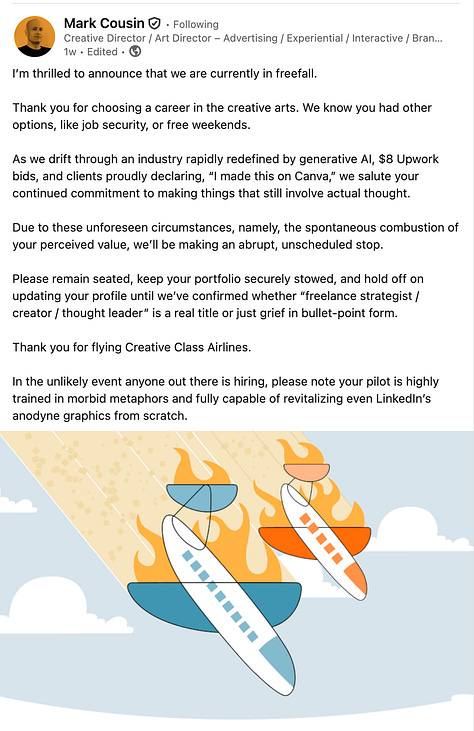
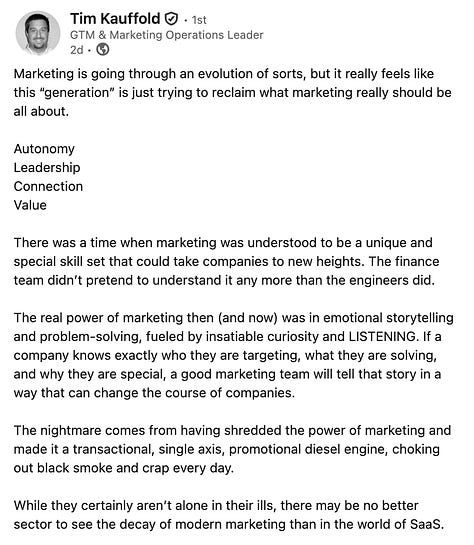
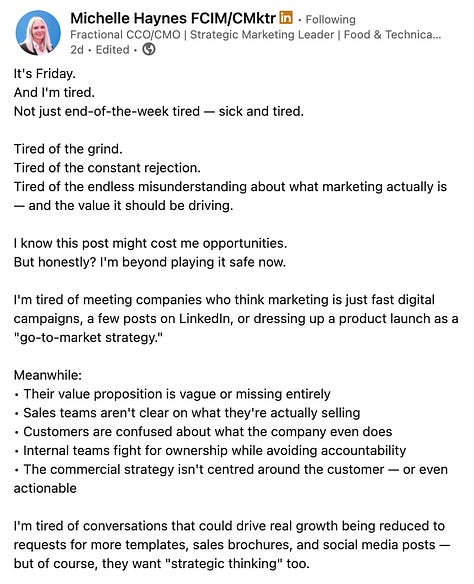
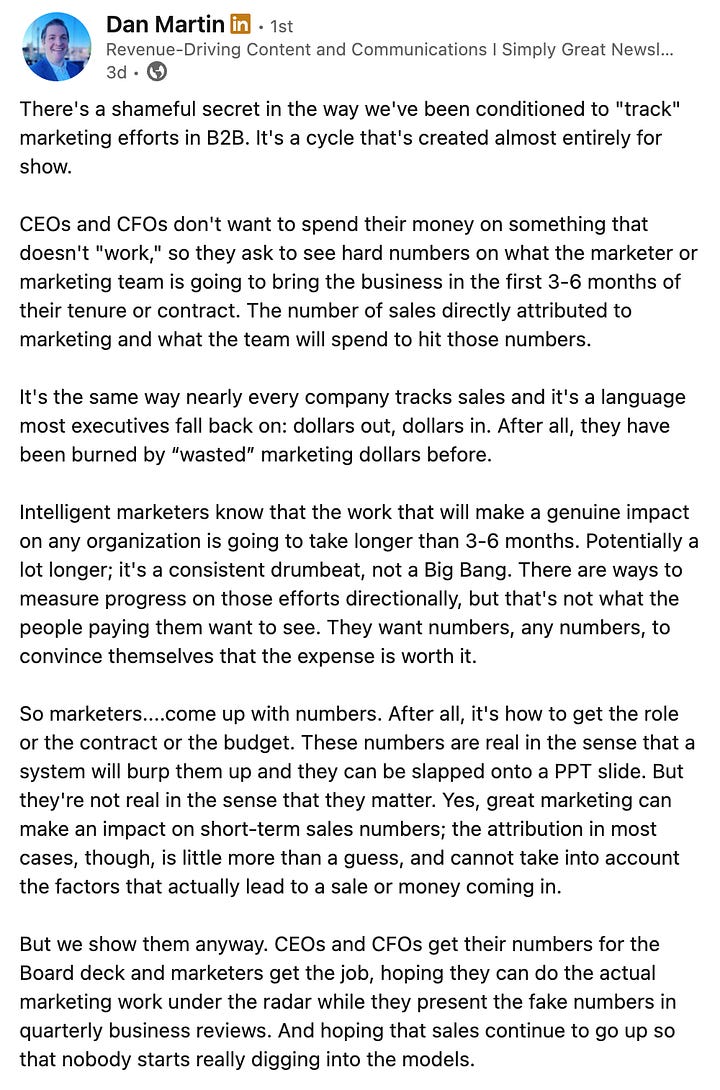
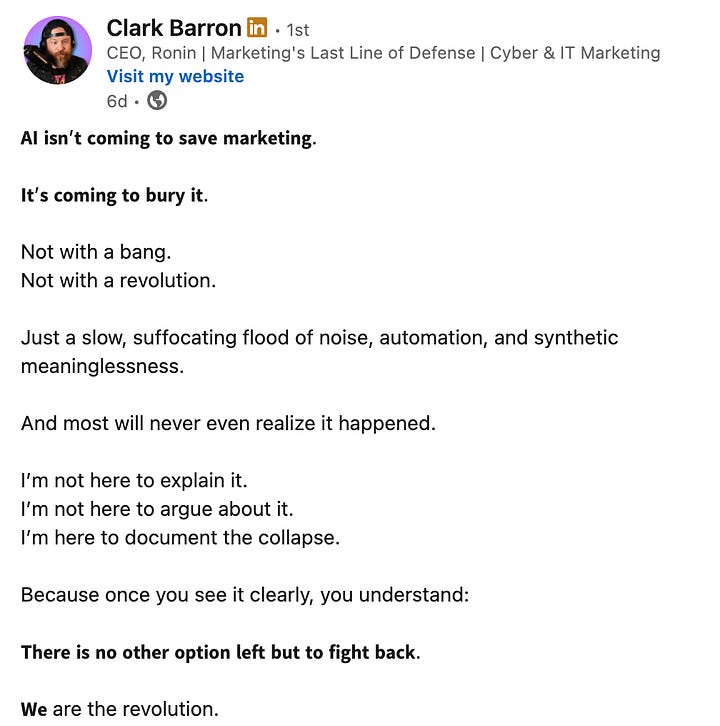
What strikes me isn't just the sobering realization that marketing is a system of broken incentives (a drum I’ve been beating for some time), but the wishful thinking that talking sense or fighting back will somehow fix it all.
That executives will suddenly "get it."
That the industry will correct itself.
That marketing will reclaim its strategic importance if we just find the magic words.
But when I ask “how do we make this better?”, most of the time there’s no answer. It’s as if the roadmap looks like this:
Call attention to shitshow → grab pitchforks → ???? → save marketing foreverI keep coming back to a song lyric that’s been haunting me lately:
“These roads don’t move, you’re the one that moves.”
Our current state has been a long time coming, and marketing isn't going to transform itself back to the glory days just because we want it to. The paths laid down by decades of misaligned incentives, quarterly pressures, and organizational structures aren't suddenly going to reroute themselves to give us our rightful place.
This ain’t True Detective Season 1, and time isn’t a flat circle. It’s a one-way street that has AI-shaped potholes all over it.
So, given this, let's talk about something more important than saving marketing. Let's talk about saving ourselves.
💪 Actionable Tip: Ask This Question
Product teams have this brilliant framework called "What would need to be true?" It helps them test assumptions and identify the conditions necessary for success before investing in a direction.
Let's apply it to our situation as marketers:
What would need to be true for marketing to become the strategic powerhouse we believe it should be?
CEOs and boards would need to value long-term brand equity over quarterly lead targets and short-term tactics
Marketing leaders would need equal authority in strategic business decisions as product and sales leaders
Finance would need to accept that most marketing impact can't be directly attributed in neat spreadsheets
The C-suite would need to see marketing as a strategic driver rather than a service department, which would require investing in marketing during downturns instead of cutting it first
Now, the uncomfortable question: How likely are these conditions to materialize in your organization?
For some people, it’s not impossible. You and I are the extremely lucky ones.
What’s more likely, however, is a CMO spending 18 months trying to "educate" her executive team on the value of brand investment — creating decks, bringing in consultants, sharing case studies, all attempting to move that road toward the vision of marketing we know is right and true — and then eventually being replaced by a demand gen specialist who promised more immediate results.
For most of us, it’s time to be brutally honest about our environment and what's possible within it. Because willing the roads to move leads to exactly the kind of exhaustion we're seeing across the industry.
So what do we do instead? I don’t have a sure answer, but I think it would start by mapping the actual territory as it exists:
Where does your organization already place value? Is it in customer relationships? Technology innovation? Operational excellence?
Who holds the most influence in your company? (Hint: Follow the biggest budgets and most frequent executive mentions)
What problems keep your CEO awake at night? Not what should worry them—what actually does?
Now, instead of trying to change deeply embedded organizational priorities, consider how you might move yourself toward them, bringing your marketing expertise along as a toolkit rather than a job title.
Imagine you come to the conclusion that your company would never value "content" in isolation (and even less with AI), but leaders obsess over customer retention. You could reframe your approach, positioning content as a retention driver rather than a marketing function. You wouldn’t change what you do much; you’d change how you connected it to what matters.
The road doesn’t move. You do.
🚫 Antipattern: The Identity Fortress
When the marketing world feels like it's collapsing, there's a natural instinct to shore up our professional identities, digging deeper trenches around "real marketing" and defend them against all threats.
It could look like insisting that brand marketing can't be measured rather than finding creative ways to connect it to business outcomes. It could be rejection of AI outright, or calling out CEOs as shortsighted idiots in more-or-less public forums.
I've been guilty of this myself.
I’ve provided impassioned defenses of content's intrinsic value rather than connecting it to the business metrics leaders actually cared about. I was protecting my identity as a "content person" rather than solving business problems.
The Identity Fortress feels safe — we know who we are inside those walls — but it's actually a trap.
While we're dying on the hill of what “real marketing” means, leaders are rolling their eyes and redistributing our most valuable functions to other departments.
When product teams own customer insight, data teams own analytics, sales owns GTM strategy, and AI can generate campaigns, what's left? Not much worth defending.
The most tragic version of this is the marketer who becomes so committed to marketing's "rightful place" that they burn out fighting for a vision that their organization has no interest in adopting. They mistake professional identity for purpose… and then wonder why they're so freaking exhausted all the time.
Pitchforks are heavy — and not especially effective when you learn that the monster in the tower is the sad reality that marketing doesn’t mean the same thing it did twenty years ago.
💡 Big Idea: We're Not Here to Save Marketing
A CEO once told me, "You do so much more than just marketing" — a statement that was both compliment and indictment. It revealed that despite all my efforts, "marketing" itself remains misunderstood and undervalued, even among its allies.
But it also suggested an answer to all this.
As I’m swirling around in this existential doom loop, here’s what I’m learning: It’s not my job to save marketing. It IS my job to create impact using whatever tools and positioning work in my environment.
Marketing as we idealistically define it may never be fully embraced in most organizations. The power structures working against it are simply too entrenched.
But you can survive regardless — by doing more than what they think you’re capable of.
I’m not saying that we should abandon marketing principles. But we also need to recognize that our value can and should transcend the increasingly narrow label of “marketing” in most organizations.
For individual marketers, this means:
Develop expertise outside the box. Learn financial modeling. Master data analysis. Understand product development. The more you can move between disciplines, the less dependent your value becomes on how the organization views “marketing.” That’s a good thing.
Position yourself differently. Rely heavily on prior experiences that you never thought would be even remotely applicable to your marketing career to help you take on new opportunities: “I actually used to be a teacher if there’s a way I can help with the onboarding flow.”
Follow the money and the metrics that matter. If product usage data rules your organization, become fluent in behavioral analytics and user flows. Then show how strategic messaging shapes expectations that drive key activation moments. Start where they already place value.
I don’t claim that this is a cure-all, but looking back at how I’ve survived and even thrived in the midst of marketing’s nosedive (knock on wood), it’s been via this approach. I don’t rely on the organization to define marketing — that’s giving it way too much control. Instead I’m continually redefining myself, within and beyond those rigid boundaries.
Today’s champions are Swiss Army knives, those super generalists at the top of their craft who bring marketing expertise alongside other valuable skills.
Does this approach require more effort than staying in our siloed comfort zone? Absolutely. Is it harder than posting existential complaints on LinkedIn? Without question. But my thesis is that it’s also the only sustainable path forward.
These roads don't move. But you can.
And in that movement — that willingness to expand while carrying your marketing wisdom with you — you might just find not only survival, but the impact and influence you've been seeking all along.
Yours in contention,
Lauren
My course Bending the Spoon is full of the unspoken rules and actionable strategies that content marketers need to prove their value at work. Check it out!







